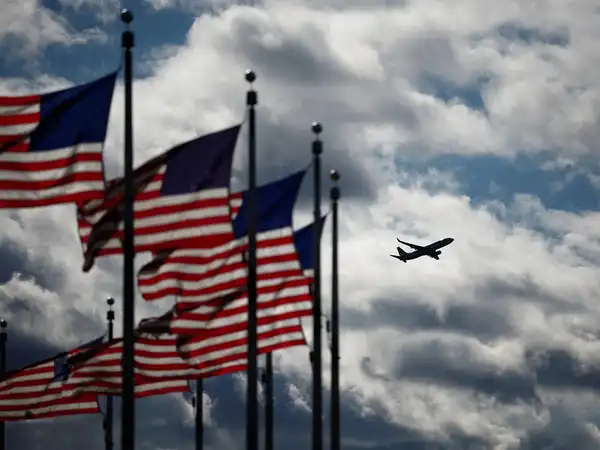The U.S. government shutdown is creating massive travel disruptions. Flights are delayed, airports are under strain, and travelers are facing uncertainty.

✈️ US Shutdown Disrupts Travel: A Crisis in the Skies
The ongoing U.S. government shutdown has thrown the country’s travel system into disarray. What started as a political deadlock has now become a real-world problem for millions of passengers. Delayed flights, exhausted staff, and mounting safety concerns are turning travel into a stressful experience for many Americans.
🚨 Why the Shutdown Hit Air Travel So Hard
Air travel in the U.S. is like a giant web — when one thread is disturbed, the whole structure shakes. The shutdown has furloughed thousands of federal employees, forcing many essential workers to continue without pay. This includes air traffic controllers and TSA agents, the very people who keep airports safe and running.
Training for new staff has been paused, inspections have slowed, and routine operations are being delayed. The system was already under strain before the shutdown began, and now, even minor disruptions are having a domino effect across the skies.
In many ways, this is a reminder of how fragile interconnected systems can be. Just like in global economic issues discussed in Global Debt Surge: A Challenge for All, one weak point can cause ripple effects that affect millions.
🛫 Flight Delays and Cancellations Surge
Travelers are feeling the impact where it hurts the most — at the gate. Flight delays have surged, with many airports reporting hours-long wait times. Smaller airports, which often rely on fewer staff, are hit even harder. Some control towers have had to temporarily reduce or halt operations, causing cascading delays across multiple states.
Passengers are arriving at airports hours in advance, but even that isn’t enough to avoid the growing lines at security checkpoints. With fewer TSA staff available, the wait to get through screening is longer than usual, adding frustration to an already stressful situation.
🧍 Behind the Scenes: The Human Cost
It’s easy to focus on delayed flights, but behind those delays are real people. Air traffic controllers are working long hours without pay. TSA agents are covering extra shifts. Many are worried about paying their bills while trying to keep the skies safe.
This human toll often goes unnoticed. The shutdown isn’t just a political story — it’s a human one. It affects families, workers, and everyday travelers. It’s a reminder that political decisions ripple down to ordinary lives, just as issues like food security affect communities around the world, explored in A World Divided by Full and Empty Plates.
🧭 Safety Concerns Rising
Air safety depends on precision and focus. But when the people managing flights are under stress, tired, or unpaid, concerns naturally grow. Controllers have warned that the system is “at the breaking point.” With fewer staff on duty, delays can quickly snowball into risky situations.
The FAA’s shortage of qualified staff was already a concern before the shutdown. Now, hiring and training programs are frozen. That means the system can’t catch up — and passengers are the ones stuck waiting.
🌍 A Bigger Picture Behind the Shutdown
This crisis is more than just delayed flights. It’s part of a bigger national struggle over budgets, political priorities, and leadership. The shutdown reflects deeper challenges facing the country, from rising debt to strained public services.
Many travelers are turning to online platforms like America112.com to get real-time updates, flight changes, and travel advisories as they navigate the uncertainty.
📝 What Travelers Can Do
While the situation remains tense, there are steps travelers can take to reduce stress during this period:
- Arrive at the airport earlier than usual.
- Check flight status regularly through airline apps.
- Choose flexible fares to manage sudden changes.
- Keep essentials in your carry-on in case of delays.
- Stay informed through reliable news and official airport channels.
The shutdown may be political, but the solutions for travelers are practical.
💬 Final Thoughts
The U.S. shutdown is more than a headline — it’s a lived experience for travelers and workers alike. From exhausted air traffic controllers to frustrated passengers, this crisis shows how dependent modern travel is on functioning systems and dedicated people.
As political leaders debate, real lives are affected on the ground and in the air. For many, this is not just about flights; it’s about trust in systems that keep daily life moving.

